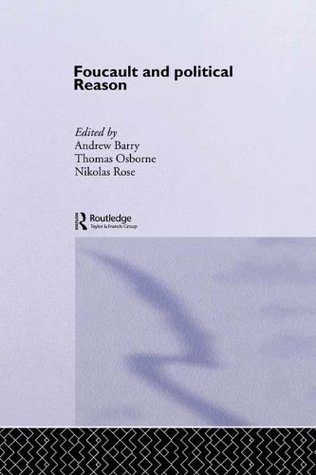Read Foucault And Political Reason: Liberalism, Neo-Liberalism And The Rationalities Of Government - Andrew Barry | PDF
Related searches:
Mar 31, 2009 the book begins with a justification of the use of the term 'political philosophy' in relation to foucault.
Get this from a library! foucault and political reason� liberalism, neo-liberalism, and rationalities of government. [andrew barry; thomas osborne; nikolas s rose;] -- despite the enormous influence of michel foucault on gender studies, social theory, and cultural studies, his work has been relatively neglected in the study of politics.
Liberal government and techniques of the self, graham burchell governing advanced liberal democracies, nikolas rose liberalism, socialism and democracy.
Foucault's lead in this respect, but, since it also offers a critique of foucault's analysis of political reason, it does so at a certain remove. It begins by outlining the foucaultian treatment of government and its implications for our understanding both of political reason in general and of liberalism as a specific rationality of government.
Foucault correlates the police with the emerging governmental rationality: political economy. 4 it is in these supplementary comments that foucault unveils the inherent connection between biopower and the economic conditions that give rise to a shift in policy.
Governmentality, discipline, modern political reason, gramsci, subjectivity. La crítica de foucault a la razón política: individualización y totalización.
Mar 11, 2019 this is an excerpt from the introduction to thomas lemke's foucault's analysis of modern governmentality: a critique of political reason which.
One of the enlightenment's tasks was to multiply reason's political powers. Omnes et singulatim: towards a criticism of political reason: the tanner lectures on human values, delivered at stanford university, october fouca.
) (1996): foucault and political reason: liberalism, neo-liberalism and rationalities of government.
This volume draws on foucault's own research to challenge this view, demonstrating the central importance of his work for the study of contemporary politics. It focuses on liberalism and neo- liberalism, questioning the conceptual opposition of freedom/constraint, state/market and public/private that inform liberal thought.
Political reason: liberalism, neo-liberalism and rationalities of government (london: ucl press, 1996); mitchell dean and barry hindess (eds.
The work of twentieth-century french philosopher michel foucault has increasingly influenced the study of politics. This influence has mainly been via concepts he developed in particular historical studies that have been taken up as analytical tools; “governmentality” and ”biopower” are the most prominent of these.
One can only speculate as to the reasons why, but no doubt the experimental character of these courses figures among them.
Foucault is often thought to have a great deal to say about the history of madness and sexuality, but little in terms of a general analysis of government and the state. This volume draws on foucault's own research to challenge this view, demonstrating the central importance of his work for the study of contemporary politics.
Despite the enormous influence of michel foucault in gender studies, social theory, and cultural studies, his work has been relatively neglected in the study of politics. Although he never published a book on the state, in the late 1970s foucault examined the technologies of power used to regulate.
Foucault coins the concept of governmentality as a guideline for the analysis state reason as a political government of men securing welfare in this world.
But that was michel foucault (1926-1984)-a lifelong political and philosophical radical, erstwhile communist, a votary of the student insurrections of 1968, apologist for the iranian revolution, prison rights campaigner, aids activist, and early aids victim.
K lindblad-toh, cm wade, ts mikkelsen, ek karlsson, db jaffe, nature 438 ( 7069), 803-819, 2005.
Because neoliberalism characterizes the governmental and economic reason and practice of late-modernity, recalling foucault's erudite.
Foucault and political reason: liberalism, neo-liberalism and rationalities of government. Barry, andrew (editor)/ osborne, thomas (editor)/ barry, andrew/ rose, nikolas (editor) published by univ of chicago pr (1996) isbn 10: 0226038262 isbn 13: 9780226038261.
Despite the enormous influence of michel foucault in gender.
Because neoliberalism characterizes the governmental and economic reason and practice foucault, genealogy, liberalism, neoliberalism, political economy.
The history of madness thus takes seriously the connection between philosophical discourse and political reality.
Foucault and political reason: liberalism, dynamics of resistence against this political rationality, neo-liberalism, and rationalities of government.

Post Your Comments: